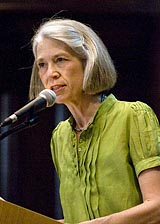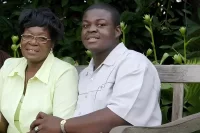Leading to change

President Hansen has convened two Presidential Symposia, in 2007 and 2008, around issues of diversity and changing U.S. demographics.
In May 2007 and 2008, I convened a Presidential Symposium focusing on issues related to diversity and inclusiveness, values that define, inspire, and challenge Bates. This year, members of the Bates campus community were joined by current and former Trustees, alumni, and visitors from around the region to welcome Morris Dees, founder and chief trial lawyer of the Southern Poverty Law Center.
Reflecting the symposium’s theme, “Unswerving Values, Changing Times,” Dees used personal narrative to explain his deep faith in the power of love and justice to break down barriers in U.S. society that still divide us. “The march for justice…didn’t end when slavery was abolished, when women got the right to vote or when gays and lesbians obtained more rights,” Dees said. “The march for justice continues today.”
Dees and the SPLC continue to seek legal redress against all forms of discrimination and to help U.S. educators teach respect and understanding in the classroom. In recent years, their researchers and investigators traveled the country to “take the temperature” of society vis-à-vis issues of prejudice, racism, and hate crimes. “Universally,” said Dees, “people were saying, ‘We are better than that. These people committing these acts: they don’t represent us.’ We found people reaching out to victims of hate and intolerance and prejudice and saying…‘We want you to be a part of us, and we want to be a part of you.'”
Dees’ personal message built on the theme of last year’s inaugural symposium, “A College for ‘Coming Time’: Diversity and Changing Demographics in Higher Education.” Our 2007 speakers were Trustee Jamie Merisotis ’86, founder of the Institute for Higher Education Policy and recently appointed president of the Lumina Foundation, and Blenda Wilson, former president and CEO of the Nellie Mae Education Foundation. The coming demographic changes that they discussed are profound.
In the next decade, the country’s population will continue to shift west and south, moving away from the Northeast. Many regions, and especially New England — Bates’ primary “market” since 1855 — will see a significant decline in white high school graduates. Hispanics, African Americans, and other population groups who currently have less access to higher education will increase significantly.
America’s demographics are changing, and we welcome the opportunity this gives us to continue fulfilling the promise of Oren Cheney, our forward-looking founder who dreamt of educating young people who did not have easy access to higher education in his day. As our campus fosters diversity broadly defined, all present and future students benefit.

Morris Dees (left) talks with President Hansen before his keynote address in the Chapel. Photograph by Phyllis Graber Jensen
Our Presidential Symposia are part of an initiative focused on the student experience before, during, and after life at Bates. In the early stages of this initiative, we have seen promising results in recruiting and matriculating record numbers of students from underrepresented racial, ethnic, and socioeconomic groups. In the alumni arena, this fall’s Homecoming program, “Faces of Bates Across the Decades,” on Oct. 25, will be a day for alumni and students of color to make and strengthen connections.
Given our legacy and our determination today, Bates is well-positioned to play a leadership role in realizing the educational value of diversity.
At Bates, in the curriculum and in campus life, challenging the intellect and respecting the person are equally valued. We are a tight-knit community, but we also treasure the capacity and courage to disagree frankly.
At Bates, we are close but not close-minded. We have shown ourselves willing at important times to be agents of change.
At Bates, we have never been cursed with an overwhelming sense of our own entitlement. Yet we can take great pride in the accomplishments of the many Bates alums who become leaders in their fields, including those who toil both inside and outside the limelight to improve society’s well-being.
While the tactics we employ to enhance diversity and inclusion will continue to change over time, our goals will not. At Bates, we seek excellence that is not elitist or self-serving. We seek to provide an education that prepares highly promising young minds from all backgrounds to work, to lead, to solve problems and to serve in the richly diverse and ever-changing world.
By Elaine Tuttle Hansen




